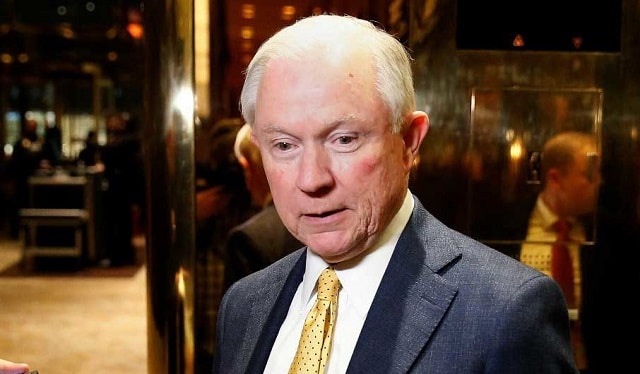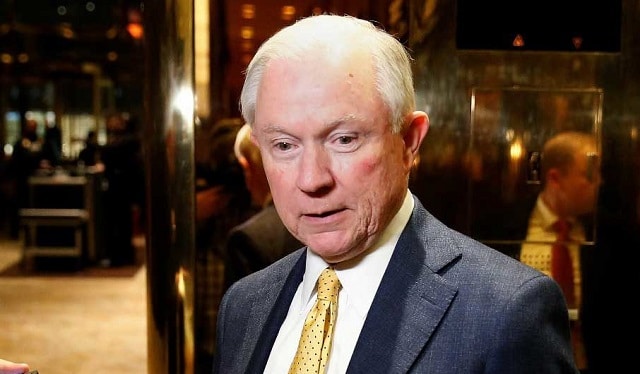United States Attorney General Jeff Sessions has worried many advocates for legal medical and recreational marijuana because of his comments, before and since becoming attorney general, critical of both marijuana and its legalization for any purpose. However, in questions and answers with reporters Wednesday in Richmond, Virginia, Sessions indicated that the Trump administration will continue following the Obama administration policy of refraining from many prosecutions of individuals for US marijuana law violations if they are complying with state marijuana laws.
In particular, Sessions pointed to the August 29, 2013 “Cole memorandum” adopted by the Obama administration to guide US Department of Justice marijuana enforcement decisions in light of conflicts between states’ legalization and US laws. Sessions said: “The Cole memorandum set up some policies under President Obama’s Department of Justice about how cases should be selected in those states and what would be appropriate for federal prosecution, much of which I think is valid.” This declaration leaves Sessions room to increase prosecutions in some circumstances. But, it importantly indicates that the Trump administration’s plan is for the general policy to remain the same.
The Cole memorandum itself provides Sessions and the DOJ with significant avenues for expanding marijuana prohibition enforcement. The memorandum states that “attorneys and law enforcement” are directed to “focus their enforcement resources and efforts, including prosecution, on persons or organizations whose conduct interferes with” any of eight listed priorities, “regardless of state law.” Included among the listed priorities are preventing distribution of marijuana to minors, preventing diversion of marijuana from states where it is legal to states where it is illegal, and preventing drugged driving and the exacerbation of other public health problems from marijuana use.
Notably, the Cole memorandum’s list of continuing US marijuana enforcement priorities irrespective of state laws also includes “[p]reventing revenue from the sale of marijuana from going to criminal enterprises, gangs, and cartels” and “[p]reventing state-authorized marijuana activity from being used as a cover or pretext for the trafficking of other illegal drugs, or other illegal activities.” Both of these listed priorities could potentially be used to justify ramping up US marijuana enforcement in states with legal medical or recreational marijuana as part of the Trump administration’s initiatives to crack down on criminal organizations and on illegal drugs activity generally.
On the 2016 presidential campaign trail, and as president, Donald Trump has been singing the drug warrior tune. In a February speech to the Major Cities Chiefs police organization, Trump said that one of the effects of his proposed “ruthless” war on drugs would be to reduce violence in America. While this type of talk is welcomed by people who value the drug war as a big police work program, it is viewed as absurd by people who understand that the war on drugs is at the root of violence associated with the drug trade.
And that was not just loose talk. The same week, Trump signed an executive order in which he declared a commitment to taking a long list of actions to fight “transnational criminal organizations” including drug cartels. Echoing Trump’s speech, the executive order states that “the trafficking by cartels of controlled substances has triggered a resurgence in deadly drug abuse and a corresponding rise in violent crime related to drugs.” But, the crime and violence have their ultimate source in prohibition. Making that prohibition more ruthless risks upping the violence related to the drug trade.
There is only so much the US government can fight a war on marijuana without the cooperation of state and local police and prosecutors. This fact means that, even if the US government sought all-out enforcement of US marijuana laws in states that have opted, to some extent, for legalization or decriminalization, it lacks the resources to do so. Sessions appears to understand this. “[E]ssentially we’re not able to go into a state and pick up the work that the police and sheriffs have been doing for decades,” Sessions said in the Wednesday Q & A with reporters.
Further, recreational marijuana legalization’s majority countrywide popular support, and the overwhelming countrywide popular support for medical marijuana legalization, makes it yet more difficult for the US government to use law enforcement to tear away the protections provided by states’ liberalization of marijuana laws. The eight states plus Washington, DC with recreational marijuana legalization adopted it via ballot measures. Also, in many of the majority of states with medical marijuana legalization, it too was established via popular votes on ballot measures.
Meanwhile, among many Republicans, who as a group tend to be less supportive of legalization, there is strong opposition to the US government trying to trounce states’ efforts to go their own way on marijuana policy even if the individuals’ preference is that states pursue a more restrictive approach. This is part of the reason why opposition to the US government enforcing harsher laws against marijuana in states that have legalized medical or recreational marijuana scores 71 percent agreement in a February Quinnipiac University national poll that records a lower 59 percent support for marijuana legalization in America.
In addition to public opinion and the lack of US government resources to enforce US marijuana prohibition absent state and local governments’ cooperation, an appropriations amendment regarding respecting state medical marijuana laws has been interpreted by the Ninth US Circuit Court of Appeals as preventing US government prosecutions of people complying with state medical marijuana laws. Indeed, this appropriations provision was pointed to by White House Press Secretary Sean Spicer in a February 23 press briefing as a reason why the Trump administration would not prosecute people complying with state medical marijuana laws.
Regarding recreational marijuana, for which there is no similar statutory restraint on enforcing US law that differs from state law, Sessions’ comments Wednesday are largely in line with what people should have expected given Trump’s October of 2015 campaign declaration that states should decide the legality of marijuana.
Many people in the media commented regarding White House Press Secretary Sean Spicer talking in the February 23 press briefing about the US government employing “greater enforcement” regarding recreational marijuana irrespective of states’ legalization. But, their reports tended to leave out Spicer’s negation of that comment later in the same press briefing.
Indeed, Spicer a month earlier provided reason for marijuana legalization advocates to chill some regarding Trump administration marijuana prohibition enforcement in states that have implemented legalization. In January, when Sessions was proceeding through the US Senate confirmation process, Spicer stated the following at Fox News in response to a question about Sessions’ anti-marijuana views:
I just want to make sure everyone understands, when you come into a Trump administration, it’s the Trump agenda that you are implementing, not your own. And I think that Sen. Sessions is well aware of that.
We should expect that Sessions will continue to speak in opposition to both the use of marijuana and the liberalization of marijuana laws. Indeed, just two weeks back Sessions expressed his opposition to marijuana being sold at “every corner grocery store” — a position Sessions repeated in a speech he presented on Wednesday before the Q and A with reporters. However, Sessions can remain a vocal war on marijuana advocate and, at the same time, in his job as attorney general, follow a moderated path regarding enforcement of US marijuana laws. In fact, this appears to be what Sessions will do.


